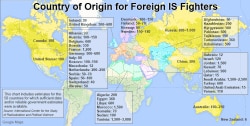The threat posed by foreign fighters flocking to Iraq and Syria is "not even close to being under control," top U.S. intelligence officials are warning the U.S. Congress.
FBI Assistant Director Michael Steinbach told the House Homeland Security Committee on Wednesday the uncertainty about the number and the whereabouts of would-be foreign fighters applies even to those hailing from the United States.
"I don't know every person there, and I don't know every person coming back," he said.
The U.S. intelligence community estimates more than 20,000 foreign fighters have now traveled to the conflict zones in Iraq and Syria, up from 15,000 last September. Although most of the foreign fighters are coming from countries in the Middle East or North Africa, officials say at least 3,400 are from western countries, including at least 150 would-be foreign fighters from the U.S.
No matter where they come from, the majority now seeks to join with the Islamic State, which is actively seeking to expand its global footprint..
National Counterterrorism Center Director Nicholas Rasmussen said the terror group's social media outreach is "robust and effective" despite the brutality it portrays.
"Their ability to generate timely propaganda continues to grow," he said. "ISIL has proven far more adept than core al-Qaida ever was, or more adept than core al-Qaida's affiliate groups, more adept at using these new social media tools to reach a broader audience."
Officials say Islamic State's reliance on social media does not help them track foreign fighters.
"In many cases, the information we have about foreign fighters travelling to the conflict zone stops when they get there," Rasmussen said. "And we don't have as much insight or nearly enough insight into what actually happens when they're on the ground in Syria."
U.S. counterterror officials and lawmakers have long worried about the threat from foreign fighters returning from Iraq or Syria, concerns that have been heightened following the recent, deadly attacks in France and raids in Belgium.
House Homeland Security Committee Chairman, Republican Michael McCaul finds the trend alarming.
"These fanatics want nothing less than the destruction of our way of life," he said. "Now their ability to match words with deeds is growing at an astonishing rate."
U.S. officials have said efforts to stem the flow of foreign fighters have been starting to make a difference, citing increased cooperation from partners in Europe, described by NCTC Director Rasmussen as a "pendulum swing" from what was taking place just a few years ago. Still, he said worrisome gaps remain, in part because of the reluctance of European countries to share bulk metadata.
"We know what we know but that comes from a wide variety of sources, and we have always assessed that there is likely more information out there that we have not yet been able to collect, either from our foreign partners or from other intelligence means," he said. "And that it's possible that greater numbers of foreign fighters and potentially greater numbers of individuals from western countries and the United States have traveled to the conflict zones."
One source of concern is Turkey, which has been used repeatedly as a transit point for foreign fighters looking to enter Syria.
In an interview with Turkey's Anadolu news agency last week [February 4], Turkish Interior Minister Efkan Ala said Anakara "imposed entry bans on 9,955 people from 91 countries" but there have been concerns about Turkey's ability to implement such a ban.
Rasmussen told lawmakers Wednesday that success in stemming the flow of foreign fighters "requires a functioning effective partnership with the Turks."





